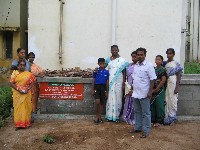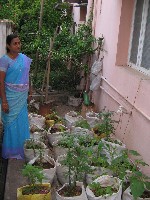|
Making Waste Pay
:The Dindigul Experiment
Proper
and efficient disposal of solid waste
is a
major problem in all towns in every part of the world. CLEAN-India has
been aiming at community-based mechanisms for managing organic waste,
encouraging people participation. CLEAN-Dindigul team on its return from the CLEAN-India Meet in Delhi in February 2005, decided to implement the concept of city farming in Dindigul. The mindset of the people and lack of space were some of the initial hurdles that one faced. Finally it was decided to set up a waste management system in Rani Mangammal (RM) Colony where domestic solid waste was being dumped on the side of the road or in front of the houses. Getting started A meeting was organized with the colony residents. The students of M.S.P.Solai Nadar Memorial Higher Secondary School, Dindigul, explained the hazards of dumping solid wastes so close to homes. Fifty women participated in the beginning, this gradually came down to 20 and by the third meeting there were just 14 women. A decision was taken to form a club named Kurunji Women’s Eco Club. The 14 members took on the task of city farming. Organising women is not easy, preoccupied as they are with domestic and other chores, social activities at best, is a low priority for them. To motivate them, training programmes were organized on income generation activities like making agarbathi, phenyl and candles. This saw some eager participation. To further strengthen the eco club and to stop further reduction in the membership, each member was asked to pay Rs 50 per month as “savings”. The total amount collected, Rs.700, was handed over to one of the members of the club at a low interest. This became a continuous process and went on month after month. A while later an awareness cum training programme was conducted on city farming and vermi-composting for proper disposal of solid wastes generated from their houses. Moving forward
Initially the concept of city farming was introduced in the houses of
the club members. They were directed to segregate the wastes and store
the biodegradable part separately. The waste was then mixed with soil
and the mixture was kept in old, used cement bags on the rooftop. Then
seedlings of vegetables were planted in the bags. There was resistance,
since other households objected to keeping waste on their rooftops. To
overcome this problem an open space in the colony was selected and
parthenium and erythrina indica were grown around as a fence to prevent
animals getting at the growing saplings. The bags were kept in the protected area with the members taking care of the seedlings. In the meantime, residents of neighbouring houses expressed interest to start the process in their households. Gradually 50 households joined in the programme. Seedlings of vegetable plants like brinjal, beans, tomato, radish, beetroot, cluster-beans and flowering plants like rose, jasmine, marigold and medicinal plants like adathoda, aloe, ocimum sanctum, ocimum basilicum and hibiscus rosa sinensis were planted. Ongoing training programmes were conducted to help the women maintain the plants. The growth was luscious and the yields were rewarding. Complete waste management solutions The residents started showing more interest and wanted to construct a vermi-bed for holistic management of solid waste in their colony. They were asked to pay 50% of the cost of construction of vermi- bed, to which the residents agreed. A vermi-bed with two chambers was constructed using hollow blocks. The size of the vermi-bed is 17 feet x 5 feet x 3 feet. The waste collected from the households is added to one chamber where partial decomposition takes place. Cow dung slurry is added to the waste to hasten the process of decomposition. This partially decomposed waste is put into the other chamber where the earthworms are added (one kilo of Eudrilus eugeniae species earthworms). Regular watering is done to maintain the moisture in the vermi-composting and partial decomposition chambers. This process of partial decomposition in one chamber and vermi-composting in the other is continuous and is carried out simultaneously. The vermi-compost is harvested in 45 days. The efforts of the residents of RM Colony have started to bear fruits. An average of 750 kg of compost is generated each month, which is sold at Rs 4 per kg thereby earning revenue of Rs 3000 per month. The vermi-compost is in heavy demand in the area. People are eager to get the compost for their gardens. Thus in about three months the expenditure costs will be recovered and people will start reaping the benefits of collective action. The efforts of the Kurunji Women’s Eco-club indicates that a small group of people with strong determination and commitment can bring about a change, not only in the environment of a town but also in the mindset and attitude of the people.q |

